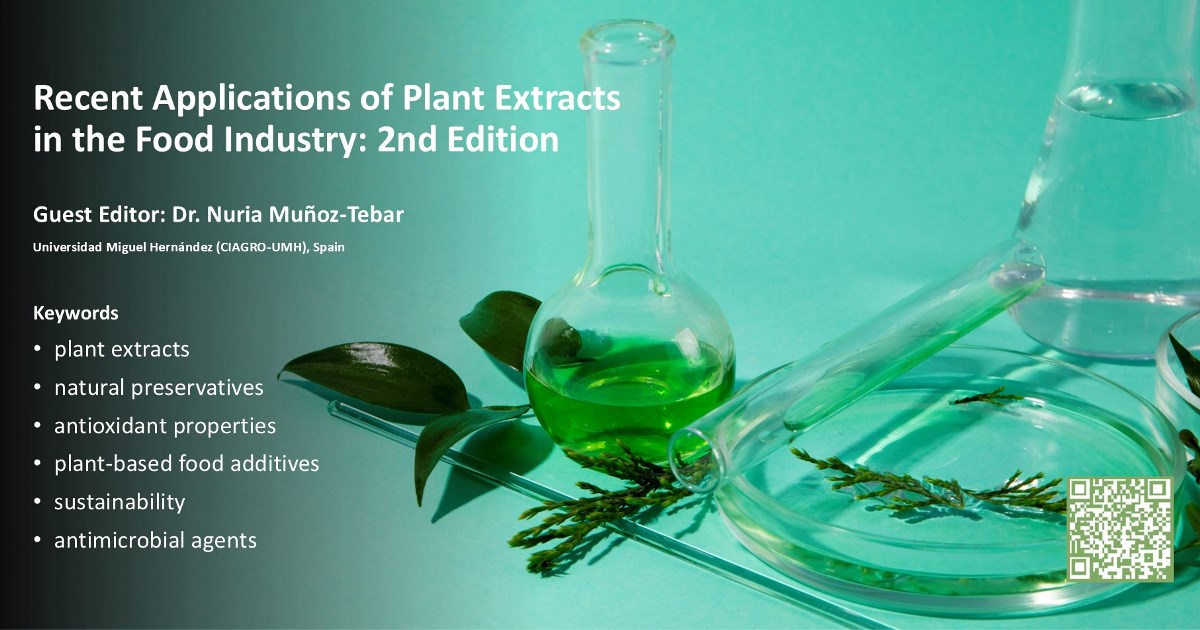Recent Applications of Plant Extracts in the Food Industry: 2nd Edition
A special issue of Applied Sciences (ISSN 2076-3417). This special issue belongs to the section "Food Science and Technology".
Deadline for manuscript submissions: 10 May 2026 | Viewed by 54

Special Issue Editor
Interests: aromatic plants; antioxidant assays; functional foods; dairy science; edible films and coatings; antimicrobial activity; fungi
Special Issues, Collections and Topics in MDPI journals
Special Issue Information
Dear Colleagues,
In recent years, plant extracts have emerged as valuable ingredients in the food industry, offering a range of benefits and addressing several consumer demands. Their natural origin and potential health-promoting properties align with the growing consumer preferences for natural and functional foods.
One of the primary applications of plant extracts is as antimicrobial agents, since they possess natural antibacterial and antifungal properties, effectively inhibiting the growth of microorganisms that cause spoilage and foodborne illnesses. Plant extracts can also be used as flavor enhancers, given that natural plant extracts, such as vanilla, citrus, and mint, impart distinct flavors to various food products, adding complexity to their taste profiles.
Plant extracts also play a significant role in coloring food products, as their natural pigments offer a wide range of colors, from vibrant reds and oranges to earthy browns and greens. These extracts are increasingly used as alternatives to synthetic food colorants, which may raise concerns about the safety and usage of artificial additives.
As consumer awareness about the health benefits of plant-based ingredients grows, plant extracts are being explored for their nutritional value. Extracts from fruits, vegetables, and herbs often contain high concentrations of antioxidants, vitamins, and minerals, which can contribute to overall health and well-being. Therefore, food manufacturers are incorporating these extracts into products to promote their nutritional value and appeal to health-conscious consumers.
Dr. Nuria Muñoz-Tebar
Guest Editor
Manuscript Submission Information
Manuscripts should be submitted online at www.mdpi.com by registering and logging in to this website. Once you are registered, click here to go to the submission form. Manuscripts can be submitted until the deadline. All submissions that pass pre-check are peer-reviewed. Accepted papers will be published continuously in the journal (as soon as accepted) and will be listed together on the special issue website. Research articles, review articles as well as short communications are invited. For planned papers, a title and short abstract (about 100 words) can be sent to the Editorial Office for announcement on this website.
Submitted manuscripts should not have been published previously, nor be under consideration for publication elsewhere (except conference proceedings papers). All manuscripts are thoroughly refereed through a single-blind peer-review process. A guide for authors and other relevant information for submission of manuscripts is available on the Instructions for Authors page. Applied Sciences is an international peer-reviewed open access semimonthly journal published by MDPI.
Please visit the Instructions for Authors page before submitting a manuscript. The Article Processing Charge (APC) for publication in this open access journal is 2400 CHF (Swiss Francs). Submitted papers should be well formatted and use good English. Authors may use MDPI's English editing service prior to publication or during author revisions.
Keywords
- plant extracts
- natural preservatives
- antioxidant properties
- plant-based food additives
- sustainability
- antimicrobial agents
Benefits of Publishing in a Special Issue
- Ease of navigation: Grouping papers by topic helps scholars navigate broad scope journals more efficiently.
- Greater discoverability: Special Issues support the reach and impact of scientific research. Articles in Special Issues are more discoverable and cited more frequently.
- Expansion of research network: Special Issues facilitate connections among authors, fostering scientific collaborations.
- External promotion: Articles in Special Issues are often promoted through the journal's social media, increasing their visibility.
- Reprint: MDPI Books provides the opportunity to republish successful Special Issues in book format, both online and in print.
Further information on MDPI's Special Issue policies can be found here.





